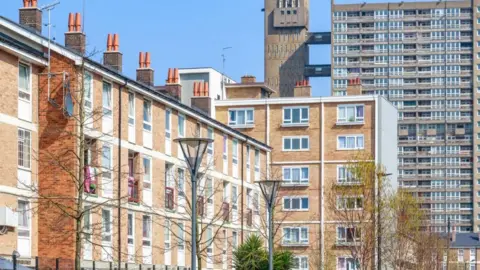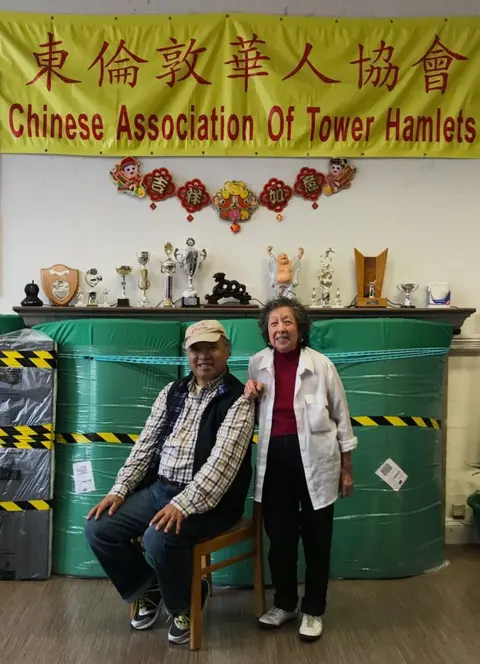How Tower Hamlets council is tackling loneliness
 BBC
BBCMore people are seeing loneliness as a part of getting older, according to campaigners. One London council is so concerned it has started to treat the issue as a public health priority.
Ted Patten was born just 20 minutes away from the east London flat he lives in today. At 72, he has spent much of his life working as a butcher and hospital porter in Tower Hamlets.
But these seemingly deep links to the neighbourhood have not been enough to protect him from loneliness - something he has felt more acutely since his wife died two years ago.
"It comes as quite a big shock to you when you are on your own. It really is very, very tough," he said.
"If you don't see anybody for weeks on end, you then go outside and you see people you know … and you try to avoid them.
"Not because you actually want to avoid them, but because you know people will come up to you and say, 'I feel so sorry, it's terrible'."
A recent study showed three in four people - with an average age of 63 - suffer from loneliness.
Tower Hamlets council says an influx of young professionals now means only one in 17 people is older than 65, making those like Mr Patten particularly isolated.

According to the Campaign to End Loneliness, the problem is worsened by a reluctance to admit being lonely and seek help.
Spokeswoman Alice Stride said: "While levels of loneliness has stayed at similar levels, more people just see it as part of being older.
"More live away from families, people work longer hours and there is the big issue of thinking there is a huge stigma to admitting feeling lonely.
"We want loneliness to be where mental health now is in the public discourse. Everyone in every community needs to see they have a part to play in alleviating loneliness."
To tackle the problem, Tower Hamlets council has poured £640,000 a year into a project connecting over 50s with activities, local services and each other.
It had also funded 20 volunteers to talk to 600 elderly people about what contributes to loneliness in the borough, targeting places such as lunch clubs, a mosque and a cafe where people with Alzheimer's go to talk about dementia.
Another of its initiatives matches care home residents with volunteers based on common interests, such as doing crosswords, in a bid to boost social interaction.
Tower Hamlets mayor John Biggs says tackling loneliness is a worthwhile endeavour.
"We see loneliness as a real public health priority," he said.
"These projects provided a valuable insight into what we can do as a community to make life better for residents suffering from loneliness.
"Reducing loneliness not only improves people's health and wellbeing - transforming their lives - but also reduces the strain on health and care services."
 Getty Images
Getty ImagesTower Hamlets is one of the UK's most ethnically diverse areas and one third of residents do not speak English as their first language.
For Mr Patten, living among the country's highest concentration of Bangladeshi-speakers has made him question whether his habits make him lonelier. He also thinks the community does not mix enough.
"Bangladeshi families don't split up. They tend to help each other. They look after their parents, grandparents. We don't," he said.
Lifelong Tower Hamlets resident Sabiha Khanam, who has been volunteering with older locals for two years, agrees with him.
"Part of [loneliness] comes from the fact that you choose not to communicate with people who aren't like your own," the 27-year-old said.
She says the huge importance attached by her Bangladeshi-born parents to family life can actually make them more susceptible to loneliness.
"Within the white community, because it's such a norm for people to be independent and live on their own, they're more adapted to it," she said.
But as the area becomes increasingly gentrified, she worries she is not going to be able to afford to look after her parents.
The trend for investment in areas like the financial centre of Canary Wharf - in comparison to less affluent areas like Mile End in Whitechapel - has led to a widening gap between rich and poor, figures from a 2013 council report show.
A fifth of households in the borough have an annual income of under £15,000, while the average salary of people who work in Tower Hamlets is £78,000 - the second highest in UK.
Council officers Dr Somen Banerjee, who is in charge of the health of the borough's residents, said: "Tower Hamlets is a place of high deprivation, low income and a densely populated urban environment.
"When you bring all of those things together they can create high levels of loneliness.
"You have people who've been living here their whole lives being told they have to move because they can't afford to live here anymore.
"The elderly are then left living in Tower Hamlets while their family has moved."
 Jason Hawkes
Jason HawkesIn an effort to mix different ethnicities, Ms Khanam helped set up an over-50s walking group for women of all backgrounds.
She said the council should be less inclined to fund elderly groups which only cater to one ethnic community.
One such club funded by the authority is run by the Chinese Association of Tower Hamlets. It serves 700 older residents who do not speak English and provides Thai Chi and keep-fit classes in Chinese.
Ralph and Ah-Mee Lue have been going to the club every Friday for three years and enjoy that it is specifically designed for their community.

Although Mr Lue speaks English well, he says many of his friends are less lucky.
"A lot of older Chinese immigrants, when we arrived in this country, ended up working in the restaurant trade seven days a week," he said.
"There was no time to communicate with the outside world and learn English."
For Mr Patten, despite the loneliness, he says he still feels lucky to live in Tower Hamlets.
At the suggestion of his GP, he recently joined a 12-scheme which organises expeditions to the British Museum, to tackle his feelings of isolation.
He says it proved the lift he needed.
"I know it might sound silly, but handling something that someone else handled perhaps 1,000 years ago - it's quite fantastic."
